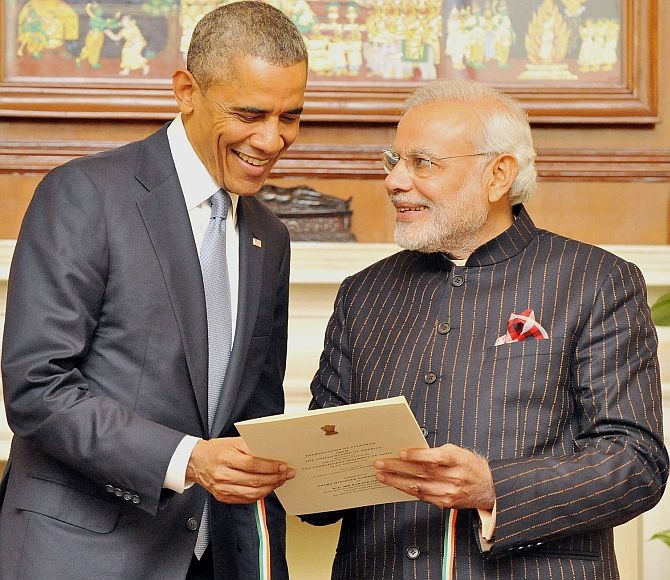'The biggest lacuna in this agreement is it is called 'full civil nuclear cooperation agreement.' Actually, it is anything but full.'
'Vital parts of the nuclear fuel cycle, like uranium enrichment and spent-fuel reprocessing, are excluded... This is a big lapse,' Dr A N Prasad, former director, Bhabha Atomic Research Centre, tells Sheela Bhatt/Rediff.com in an exclusive interview.
Dr A N Prasad, former director, Bhabha Atomic Research Centre, is an international authority on nuclear safeguards. He was part of the team that installed India's first fuel reprocessing cycle in 1964.
Dr Prasad, an alumnus of the Indian Institute of Science, Bangalore, and the erstwhile Oak Ridge School of Reactor Technology in Tennessee, has vivid memories of how Indian scientists started the fuel reprocessing plant in Trombay, off the Mumbai coast, to separate plutonium.
Dr Prasad was also posted at the International Atomic Energy Agency in Vienna as an expert member of the Standing Advisory Group on Safeguards Implementation from 1988 to 1996, and the Standing Advisory Group on Waste Management.
After retirement in 1996, Dr Prasad was invited by the then director general of the IAEA to serve as a senior specialist and consultant.
His lifetime mission is to see India as a self-reliant nation in matter of energy.
How do you see the idea of 'risk management' to end the deadlock of the nuclear liability bill? Is the insurance pool of five insurance companies and the government's participation good enough?
My first reaction is, under the current situation, with the agreement not having seen the light of the day even after more than six years of its signing, the decisive push given by our prime minister to keep things moving is laudable.
'Risk management' could be seen as a way forward to get over the logjam. I wonder why the UPA (United Progressive Alliance) government could not pursue this route and save precious time unnecessarily lost. The momentum was completely lacking!
It may be recalled, in the run-up to the signing of the India-US civil nuclear agreement by the then Congress party-led UPA government, it was mired with controversies regarding many of its provisions.
Under the din of the vehement opposition in Parliament, the agreement was passed amidst pandemonium of sorts with a wafer-thin majority and the agreement was signed in 2008.
Subsequently, against the backdrop of the terrible Bhopal gas tragedy in India in which a leading US company was responsible and the victims were very inadequately compensated, with the persistent demands of the opposition in the Parliament, the government agreed to enact a nuclear liability law as a cover for any unlikely event of a nuclear accident.
As it turned out, the US suppliers did not approve of the section which leaves them exposed to tort claims potentially opening up unlimited liability.
Unlike in the case of the Bhopal gas tragedy -- where the supplier and the operator of the plant being the same, the responsibility for liability could be fixed -- in the case of a nuclear plant, where there are a number of players such as designers, manufacturers including Indian, construction, operation, and so on, pinpointing responsibility for fixing liability is quite complex, leading to arbitration.
Since the 'administrative arrangements' are not out, it is difficult to say how the risk management through insurance pool pans out. I wonder whether even the insurance companies are fully clear about the issues involved, and it may take a while to digest this idea.
In fact, the prospective suppliers already are talking about a need for a seminar on this subject with all stakeholders to get some clarity.
However, this idea in effect is to circumvent the liability law without tampering it and thereby open(ing) the can of worms.
It appears the burden of risk of liability is being transferred from the suppliers as originally intended to the government-controlled insurance companies, thereby making in effect the Indian government liable for compensation!
This move may ultimately add to the unit cost of power generated. Till all the details are known, it can only be a conjecture.
America has agreed to not pursue the fuel-tracking clause.
I strongly feel this clause is unwarranted. When we have accepted IAEA safeguards inspections, including the intrusive Additional Protocol which is not mandatory, where is the need for duplication?
A lot of unproductive effort will have to be put in on anomaly resolution to satisfy both the agencies.
To my knowledge, this practice is not in vogue anywhere.
The US tried this concept in Tarapur in the 1960s and we didn't agree and was deleted. Perhaps this has been deliberately introduced as a bargaining chip to be used during negotiations!
I feel this simply is not a sustainable demand. This has been unduly made out to be a breakthrough concession!
After six years, the 123 Agreement will be implemented. India has finally got the full civil nuclear agreement, claim external affairs ministry officials.
The biggest lacuna in this agreement is it is called 'full civil nuclear cooperation agreement.' Actually, it is anything but full.
Vital parts of the nuclear fuel cycle, like uranium enrichment and spent-fuel reprocessing, are excluded. This has been pointed out by many, including myself, throughout the period of negotiations of the nuclear deal and discussed in Parliament with no effect.
This is a big lapse and we have meekly surrendered.
As if to add insult to injury, the word 'full' is being used time and again when it is only a partial civil nuclear agreement.
With so many large capacity nuclear power plants expected to be in operation in the coming years under this agreement, there will be need for low-enriched uranium fuel which we can 'make in India' at reduced costs.
Similarly, in course of time, there will be large quantities of spent fuel which will be discharged from imported reactors which we could reprocess in India to support our fast-breeder reactor programme to generate electricity and utilisation of our vast thorium resources.
By agreeing to exclude the ENR (spent-fuel reprocessing) technologies from the ambit of this agreement, we have missed a great opportunity.
I am terribly dissatisfied with the final outcome of the scope of this agreement which is not in national interest. The UPA government best known to them chose to sacrifice this important aspect and there seems to be no effort to correct this.
Regarding the 'carrot' dangled on our membership of the technology control regimes, including NSG (the Nuclear Suppliers Group), it is very difficult to even remotely visualise how there could be consensus in the group to admit us when large, vital parts of the nuclear fuel cycle activities like ENR are denied to us.
Already, we hear dissent from some members. It could be wishful thinking, but it is good to live on hope! I only wish best of luck to our negotiators!
One point regarding the famous, hotly debated, 123 agreement. It is a document heavily loaded in favour of the US and it hardly gives any leeway for even conflict resolution. There is absolutely no level playing field.
It will be interesting to watch how the much touted 'administrative arrangements' is worded, which is still kept under wraps.
REDIFF RECOMMENDS











 © 2025
© 2025